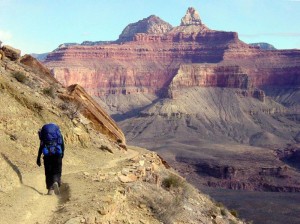Hikes in the backcountry include their own challenges, including unknown, unexpected, and unforeseeable risks, resulting in the potential for harm. Being prepared for emergencies by carrying a rescue or survival kit is, of course, part of “being prepared”!
 The National Park Service has a “Hike Smart” podcast which provides useful tips for safe hiking in the Grand Canyon, but the advice applies to all hiking activities.
The National Park Service has a “Hike Smart” podcast which provides useful tips for safe hiking in the Grand Canyon, but the advice applies to all hiking activities.
Indeed, a study found that the majority of hikers in the White Mountain National Forest of New Hampshire are unprepared for their hikes.
This story makes clear the need to be prepared when hiking in the backcountry! This story makes clear the need to have a good map, as relying on a computer map app may result in misdirection.
A hiker in New Hampshire, allergic to bees and unexpectedly being stung by bees during a hike, found the several EpiPens in her hiking gear to be useful indeed, as opposed to this hiker, also allergic to bees, who did not carry his EpiPen with him during a hike. The author was also witness to a bee bite emergency situation resulting from an adult leader being bitten during a hike at summer camp, as a result of failing to carry her EpiPen during the hike. This article in Scouting magazine tells how to survive a bee sting on a hike. Finally, this story about a hiker in Yosemite National Park having to be rescued due to an allergic reaction, and not carrying her EpiPen.
 The following articles in Scouting magazine “Lost and Found” and “Boy Scout 10 Essentials” provide additional information regarding the need for, and content of, survival kits. REI also publishes its own list of 10 essentials. And, here is a mountain rescue team’s advice regarding their 10 essentials. The website Coming Back Alive is also instructive regarding safe hiking in the backcountry.
The following articles in Scouting magazine “Lost and Found” and “Boy Scout 10 Essentials” provide additional information regarding the need for, and content of, survival kits. REI also publishes its own list of 10 essentials. And, here is a mountain rescue team’s advice regarding their 10 essentials. The website Coming Back Alive is also instructive regarding safe hiking in the backcountry.
New Hampshire’s HIKE SAFE program provides excellent information regarding gear that should be taken on both day and overnight hikes. Good advice to follow.
And, finally, the National Park Service attempted to solve the problem of too many rescues at the Lake Mead National Recreational Area in Nevada due unprepared hikers succumbing to summer heat by closing the trails during summer beginning in summer 2015.
